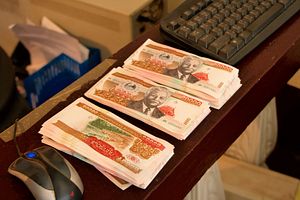Why is Thongloun Sisoulith so confident about Laos’ debt problems? The Lao prime minister, speaking recently to Nikkei Asian Review, said that he is “not concerned much about the burden of debt” that his country has taken on in recent years, much spent on infrastructure projects related to China’s Belt and Road Initiative (BRI) scheme.
There are in fact no shortage of concerns – ones which Lao economists and politicians, including Thongloun himself, no doubt recognize. Public debt crept above the 60 percent of GDP mark in late 2017, and some projections see it reaching 65.9 percent by next year. This, according to an IMF report from early 2017, has increased Laos’ risk of “debt distress from moderate to high.”
The World Bank suggests that Laos should ideally cap its public debt at 40 percent of GDP; the IMF says 50 percent of GDP. Neither looks likely anytime soon. A recent IMF report predicts public debt could grow to 70 percent of GDP by 2022 unless important changes are made.
Debt burdens are not just an economic issue for now: they also can have impact on future generations. Edmund Burke, that pitted foe of Thomas Paine, got one thing right when he argued that societies enters into a social contract “between those who are living, those who are dead, and those who are to be born.” As a result, most governments engage in some form of generational accounting whereby some thought goes into how decisions made today will bear responsibility on future generations.
What the Lao government is betting on (and it is a gamble) is that by indebting itself today future revenue will grow quicker than future outgoings, in terms of debt repayment. It’s not an uncommon bet, and some governments have won handsomely. The problem for Laos, however, is that the odds of success are slim.
An IMF report states: “The high level of debt was recognized [by government officials] as a concern and the government plans to institute reforms under the new Public Debt Management Law and the new Public Procurement Law to put a limit on annual borrowing.”
According to this document, the government is committed to reducing public debt to 55 percent of GDP by 2022. But, even if achieved, that constitutes the maximum of what international advisors say Laos’ debt ratio should be. Based on the government’s inability to reach its own targets in other parts of the economy, it is doubtful this even the 55 percent ratio will be met.
Thongloun recently told the National Assembly that Laos won’t graduate out of Least Developed Country (LDC) status in 2020, as was the target set in 2001, and now the nearest possible date is 2024. If that seemed like an admission of fault, it wasn’t. As analysts have noted, graduating from LDC status reduces a nation’s ability to access ODA, chiefly grants and low-interest loans. Without these, Laos will face even more pressure to borrow from high-interest lenders, namely China. Despite the PR backlash from Thongloun’s admission, actually remaining in LDC status makes economic sense for Laos at present.
Since becoming prime minister in 2016 Thongloun has shown himself to be a pragmatic leader. He has enacted some genuinely good reforms. The problem, however, is that he is head of a Communist Party in a one-party state.
Most clearly, while it is easy in democratic nations for a new government to blame high indebtedness and economic woes on the outgoing administration. That’s not possible in Laos. A new administration – senior positions tend to change hands once a decade – could blame the previous administration but that would mean blaming the Communist Party itself, which no apparatchik likes to do.
The additional problem for a Communist Party, especially one under increasing social and economic pressure like in Laos, is that politics becomes a zero-sum game. In democracies, a party might be voted out of office because of poor economic mismanagement but it always stands the chance of re-election in a few years’ time and, moreover, the entire political system doesn’t come crashing down if one party is removed from office. But one-party states must live temporally. It’s pointless thinking about the consequences of debt in 10 or 20 years’ time if people want your overthrow today.
What that means for future generations, then, remains to be seen. While the Party claims that those not yet born will inherit a wealthier and more developed country, it will also be the next generation that inherits the debt. And if the Party’s gamble doesn’t pay off, they’ll be the ones making the genuinely tough choices.

































